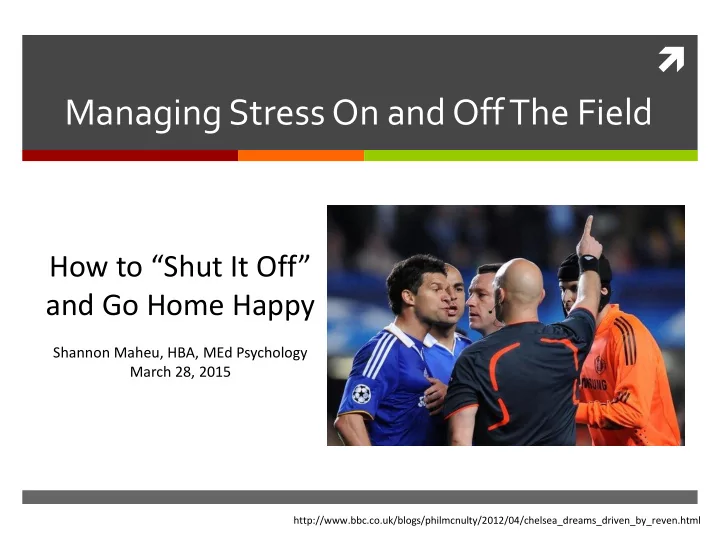

Managing Stress On and Off The Field How to “Shut It Off” and Go Home Happy Shannon Maheu, HBA, MEd Psychology March 28, 2015 http://www.bbc.co.uk/blogs/philmcnulty/2012/04/chelsea_dreams_driven_by_reven.html
Qualities of an Effective Referee 1. Reliability 5. Integrity 2. Communication 6. Common sense 3. Decisive thinking 7. Confidence 4. Elegance 8. Motivation Based on FIFA Standards & sport psychology research
The Reality of Refereeing…??? A referee is a necessary evil in the world of sports & recreation? Refereeing is the worst job in sport, yet provides the best seat in the house? Few people opt to take up the whistle and be the ‘ person ’ in the middle? WHY?
What is Stress? Stress is our body ’ s response to any demand made on it The physical and mental arousal to circumstances that we perceive as threatening or challenging The trigger that prompts the stressful reaction is called a ST STRESS SSOR
Why talk about stress? Stress from officiating has profound impacts on a referee ’ s mental health, attentional focus, performance, satisfaction with their profession & dropout intentions. (Goldsmith & Williams, 1992) “ The stress level among referees is the same as for players and coaches or other top athletes ” (Associate Professor Bjørn Tore Johansen, U of Agder)
Let ’ s have at it… 1. Prior to a match, do you have a set routine that you do? 2. During the match, list some causes that might raise your stress or anxiety? 3. On a scale of 1-10 (1=low; 10=high), rate your post game stress levels (on average). 4. What do you do to combat stress in your refereeing?
Pressure…Pressure…Pressure… There is so much pressure! http://rsrc.psychologytoday.com/files/imagecache/article-inline- Players Coaches full/article/2011/12/81766-74127.jpg Spectators Administrators Other referees Previous results Photo source: Weather Yourself
Sources of Stress: ON & OFF the Field Co Cogn gnit itiv ive e Th Theory ry of St Stre ress Causal Agent Appraisal Response • Good? • Challenge? • Cope – yes? • Bad? • Threat? • Cope – no? A person’s appraisal of a situation determines whether or not it will be stressful Personal Stress Organizational Stress Competitive Stress Image source:http://www.lightbearers.org/fight-or-flight/
How do we know we are stressed? Stress if coping resources are inadequate Our stress responses can be seen as: Physiological – increased blood pressure, flushed cheeks, headache Emotional – anxiety, fear, grief, excitement Behavioural – ways to behave in order to resolve the conflict
Top Stressors for Sport Referees? Making incorrect/controversial calls, 79% of soccer Positional concerns, referees (UK) experienced physical Abuse from coaches, players or verbal threats on at least one occasion during their Pressure of game officiating? Conflict between their officiating and life outside refereeing (i.e. family and/or work) Voight, M. (2008) Sources of Stress & coping strategies of US soccer officials. Stress & Health 25 , 91-101.
Why is stress so difficult to deal with? ON THE FIELD OFF THE FIELD Lack of time to deal Fatigue Need to focus on tasks Lack of knowledge of stress Lack of coping skills Denial
How do You Cope with Stress?
Stress-Training for Officiating Time Management Skills Training – focuses on getting organized, prioritization of tasks Checklists, prioritizing & saying ‘no’ Cognitive/Mental Skills Training – focuses on changing negative and irrational thoughts; focuses on preparation, coping & decision-making abilities Imagery, self talk, relaxation breathing Weinberg & Richardson (1990), Psychology of Officiating
Stress-Busting Techniques “Effective coping with stressful situations in officiating can serve as a buffer against burnout” Have a pre-game routine Relaxation breathing & imagery Psyching up – It’s crunch time! Humour Socialize with Stressors (if they are people) Have a post-game routine
Wrap – Up!
Recommend
More recommend